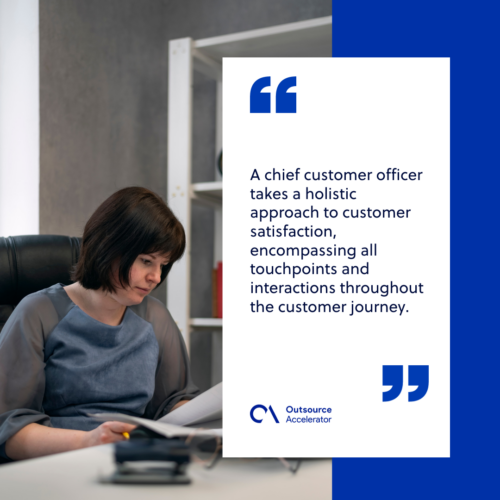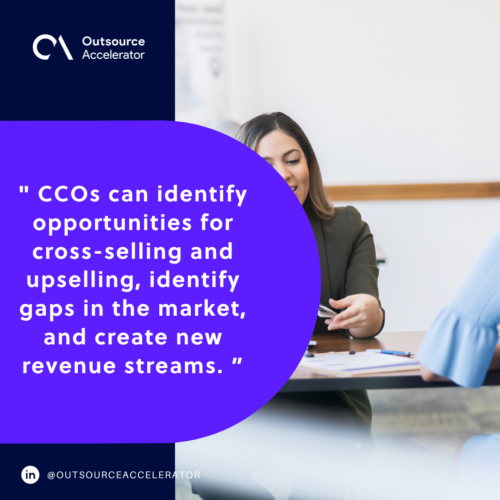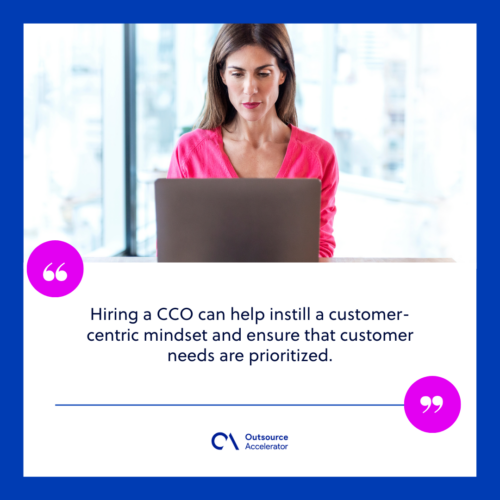Who is the chief customer officer?

A chief customer officer (CCO) is the newest addition to the C-suite positions in an organization.
The CCOs are senior executives responsible for overseeing the strategic management of the customer experience and ensuring customer satisfaction.
More companies are even employing them in their wing. Gartner found that around 90% of companies are now employing chief customer officers or the like, given the benefits they bring regarding customer satisfaction.
Find out more about this position and what it can do for your business in this article.
What is a chief customer officer?
A chief customer officer is a key member of an organization’s leadership team. This specialist goes beyond traditional customer service roles.
Part of a CCO’s responsibility is to drive customer-centric strategies and ensure that the entire organization is focused on delivering exceptional customer experiences.
A chief customer officer takes a holistic approach to customer satisfaction, encompassing all touchpoints and interactions throughout the customer journey.

Duties and responsibilities of a chief customer officer
The duties and responsibilities of a chief customer officer can vary depending on the organization’s size and industry.
However, there are several key areas in which CCOs typically play a vital role:
Developing customer experience strategies
Chief customer officers are responsible for creating and executing customer-centric strategies based on customer expectations.
They analyze customer data, identify pain points, and implement initiatives to enhance the customer experience.
Managing customer relationships
A chief customer officer establishes and maintains strong relationships with key customers. CCOs act as the main contact point for escalated issues beyond the customer team’s capabilities.
They collaborate with sales and account management teams to ensure a consistent customer experience and resolve customer concerns.
As a Chief Customer Officer, one carries the crucial responsibilities of managing customer relationships, ensuring customer success, and developing a robust customer strategy.
Monitoring and analyzing customer feedback
CCOs gather and analyze customer feedback from various sources, including surveys, social media, and customer support interactions.
Monitoring customer sentiment and identifying trends can proactively address issues and make data-driven improvements.
Collaborating with cross-functional teams
A chief customer officer works closely with other departments, such as marketing, sales, and product development.
Chief customer officers provide feedback on product and service enhancements, marketing campaigns, and sales tactics to improve the overall customer experience.
Establishing customer-centric metrics
CCOs establish and track metrics related to customer satisfaction, retention, and loyalty. They also guide continuous improvement for these efforts.
Chief client officers play a pivotal role in driving customer loyalty and fostering long-term relationships that are mutually beneficial for both the company and its customers.
With a sharp focus on customer satisfaction, they work closely with customer service representatives to address any issues promptly and maintain high standards of service excellence.
This role also includes establishing key performance metrics that focus on enhancing the customer experience and gauging customer lifetime value.
Benefits of hiring a chief customer officer
A chief customer officer brings various benefits to your company, such as the following:
Improved customer satisfaction and retention rates
CCOs have a deep understanding of customer needs and preferences. By leveraging this knowledge, they can implement strategies that enhance the customer experience, leading to higher satisfaction levels.
Happy customers are also more likely to become loyal brand advocates, increasing customer retention rates.
Increased revenue and profitability
A chief customer officer’s expertise can reduce customer churn, saving the company from hefty customer acquisition costs to replace them.
When organizations prioritize customer satisfaction, it increases revenue and profitability.
CCOs can identify opportunities for cross-selling and upselling, identify gaps in the market, and create new revenue streams.

Enhanced brand reputation
Exceptional customer experiences can significantly impact a company’s brand reputation.
Chief customer officers can ensure consistent and positive interactions across all customer touchpoints, including customer support, sales, and marketing.
Data-driven decision making
CCOs use various data sources, including customer feedback, surveys, and market research. They leverage this data to identify trends, monitor customer satisfaction, and inform strategic decisions.
A CCO can lead the customer success team to develop and implement effective customer success initiatives, ensuring that customers receive outstanding service and support.
Cultural transformation
Chief customer officer is responsible for driving a customer-centric culture within the organization.
They work closely with employees from all departments to ensure that customer needs are at the forefront of decision-making processes.
This cultural shift fosters innovation, collaboration, and a deeper understanding of the importance of the customer in driving business success.
Skills to look for in a chief customer officers
A seasoned chief customer officer possesses the following skills and attributes:
- Customer-centric mindset. A chief customer officer must be able to empathize with customers and put their interests at the forefront of decision-making processes.
- Strategic thinking. CCOs must develop long-term strategies to improve the customer experience and align them with the organization’s overall goals.
- Excellent communication skills. CCOs must effectively articulate the vision, goals, and strategies in a way that resonates with employees and stakeholders.
- Collaborative leadership. Lastly, chief customer officer must work closely with cross-functional teams and build strong relationships with stakeholders at all levels.
When to hire a chief customer officer
The decision to hire a chief customer officer can depend on several factors, such as the following:
Increased customer churn. If customer satisfaction levels are decreasing or customer churn rates are increasing, a CCO can identify and address the underlying issues to improve the customer experience.
Lack of customer-centric focus. Hiring a CCO can help instill a customer-centric mindset and ensure that customer needs are prioritized.
Tight competition on customer loyalty. If competitors are known for their exceptional customer experiences, hiring a CCO can help the organization catch up and stay competitive in the market.
Desire to enhance brand reputation. Lastly, organizations looking to enhance their brand reputation can benefit from a CCO’s expertise in identifying new opportunities and improving customer retention rates.
When hiring a CCO, it’s essential to look for individuals with a customer-centric mindset, strategic thinking abilities, excellent communication skills, an analytical mindset, and collaborative leadership qualities.








 Independent
Independent




